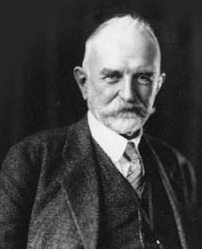User:Mfils018/sandbox
 | This is a user sandbox of Mfils018. You can use it for testing or practicing edits. This is not the sandbox where you should draft your assigned article for a dashboard.wikiedu.org course. To find the right sandbox for your assignment, visit your Dashboard course page and follow the Sandbox Draft link for your assigned article in the My Articles section. |
History of George Herbert Mead[edit]

George Herbert Mead was an American Philosopher. He was born on February 27th,1863 in South Hadley, Massachusetts. He died on April 26, 1931 in Chicago, Illinois. George H. Mead studied at two distinguished institutions Oberlin College and Harvard University.Mead was an instructor in philosophy and psychology at the University of Michigan from 1891 – 1894. In 1894, Mead attend the University of Chicago as an instructor and remained there until his death. Mead was known for his work in social psychology and Pragmatism.[1]
George Mead contribution to Social psychology was based on behavior he showed how human self-arises in the Process of Social interactions. Mead was a major thinker among American Pragmatists he was heavily fascinated with the theory of relativity and the doctrine of emergence.[1] Objective Relativism is the center of Mead philosophical work. Great minds such as Mead exploited him to other great philosophers such as John Dewey and Josiah Royce.[1]
Mead never published any of his work. Mead students edit his lectures and notes from stenographic recordings and unpublished papers and published his work in his legacy after his death.[1][2]
In Becoming Mead[edit]
George Mead is a prominent figure in sociology best known for his book Mind, Self, and Society which was put together after his death. Mead was famous for a principle of his own notion in which he did not teach for a book he did not write.
In Becoming Mead by Daniel R. Huebner the book provides a novel approach on the history of sociology in the form of a critical dialogue that faces issues discussed in the field of Sociology. The author Daniel Huebner back traces the ways knowledge on Mead had been gathered and produced. Daniel considers Mead’s biography and reputation as a social process of knowledge production. He does not chose to stigmatize Mead abnormal reputation as a separate topic of study. Mead is used as a case study and is used in a way to give a new perspective to critical questions sociologist struggle to answer.
Mind,Self and Society[edit]
Sociologist Today[edit]
Sources to take a lot at by today[edit]
Articles
- Aboulafia, Mitchell. "Mead, Sartre: Self, Object & Reflection," Philosophy & Social Criticism, 11 (1986): 63-86.
- Aboulafia, Mitchell. "Habermas and Mead: On Universality and Individuality," Constellations, 2 (1995): 95-113.
- Ames, Van Meter. "Buber and Mead," Antioch Review, 27 (1967): 181-91.
- Ames, Van Meter. "Zen to Mead," Proceedings and Addresses of the Amer. Phil. Assn., 33 (1959-1960): 27-42.
- Ames, Van Meter. "Mead & Husserl on the Self," Philosophy & Phenomenological Research, 15 (1955): 320-31.
- Ames, Van Meter. "Mead and Sartre on Man," Journal of Philosophy, 53 (1956): 205-19.
- Baldwin, John D. "G.H. Mead & Modern Behaviorism," Pacific Sociological Review, 24 (1981): 411-40.
- Batiuk, Mary-Ellen. "Misreading Mead: Then and Now," Contemporary Sociology, 11 (1982): 138-40.
- Baumann, Bedrich. "George H. Mead and Luigi Pirandello," Social Research, 34 (1967): 563-607.
- Blumer, Herbert. "Sociological Implications of the Thought of G.H. Mead," American J. of Sociology, 71 (1966): 535-44.
References[edit]
- ^ a b c d e "George Herbert Mead". Encyclopedia Britannica. Retrieved October 20, 2016.
- ^ a b "George Herbert Mead - Mind, Self, and Society". www.d.umn.edu. Retrieved 2016-10-25.
- ^ "Mead, George Herbert | Internet Encyclopedia of Philosophy". www.iep.utm.edu. Retrieved 2016-10-25.
